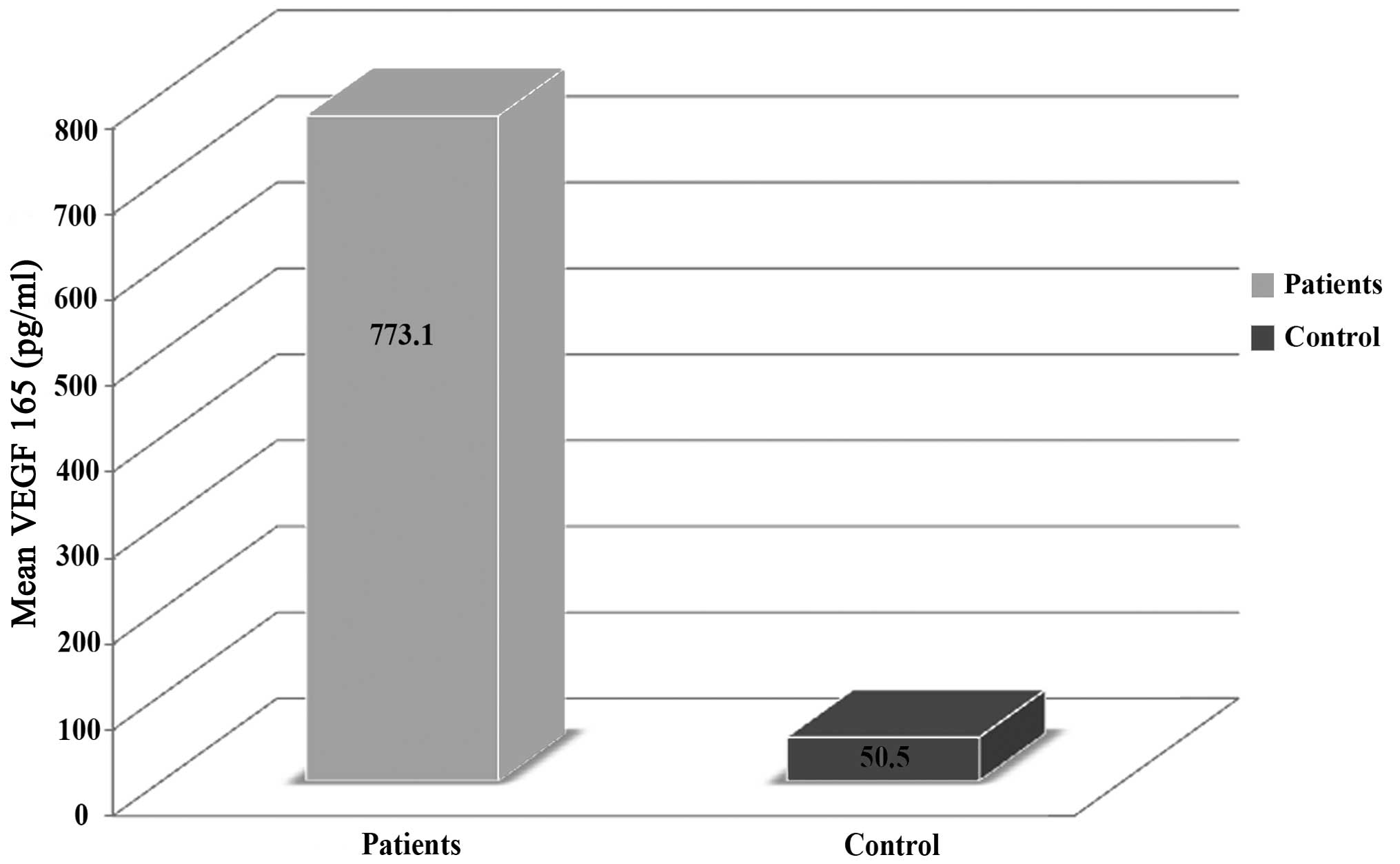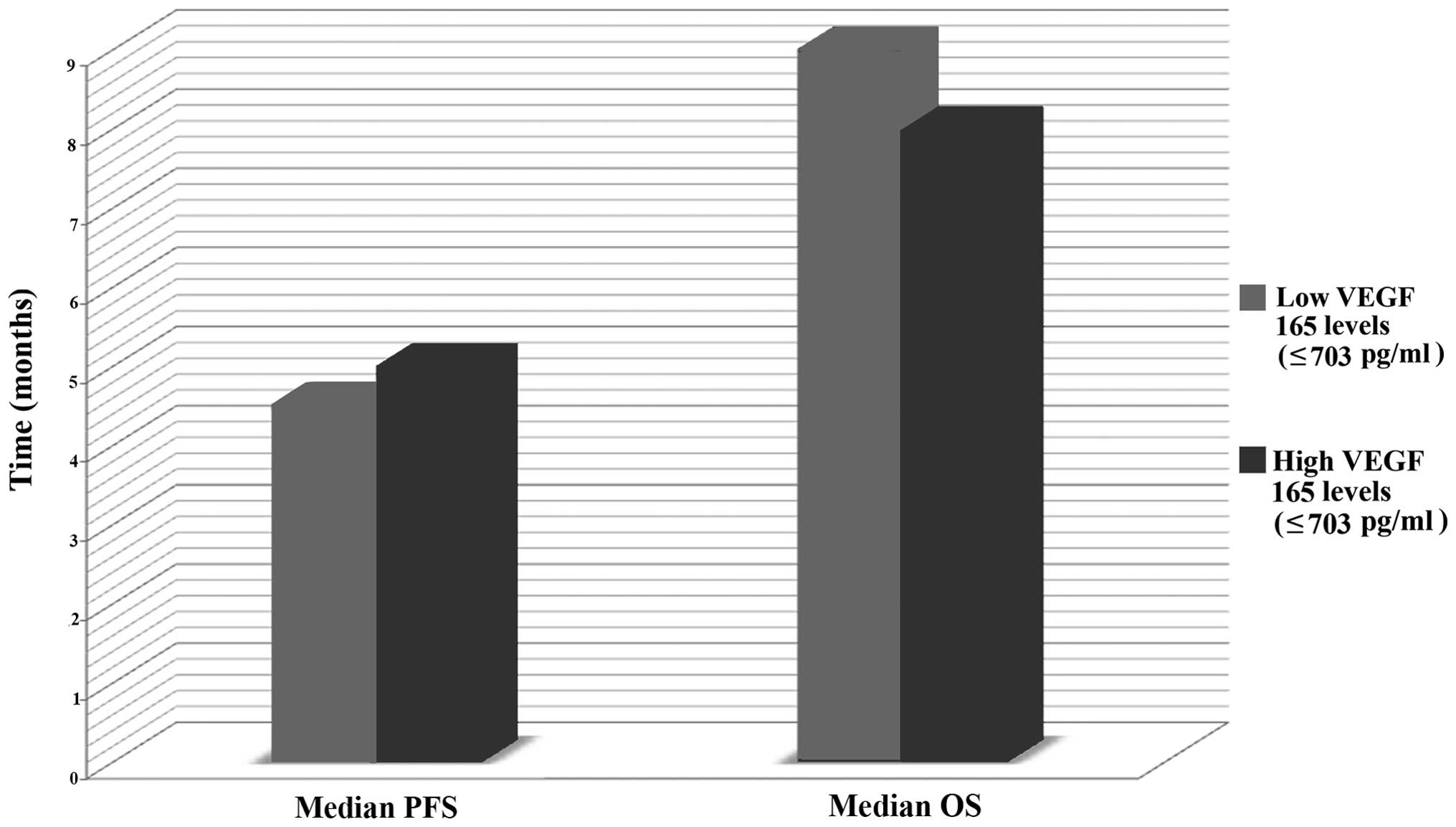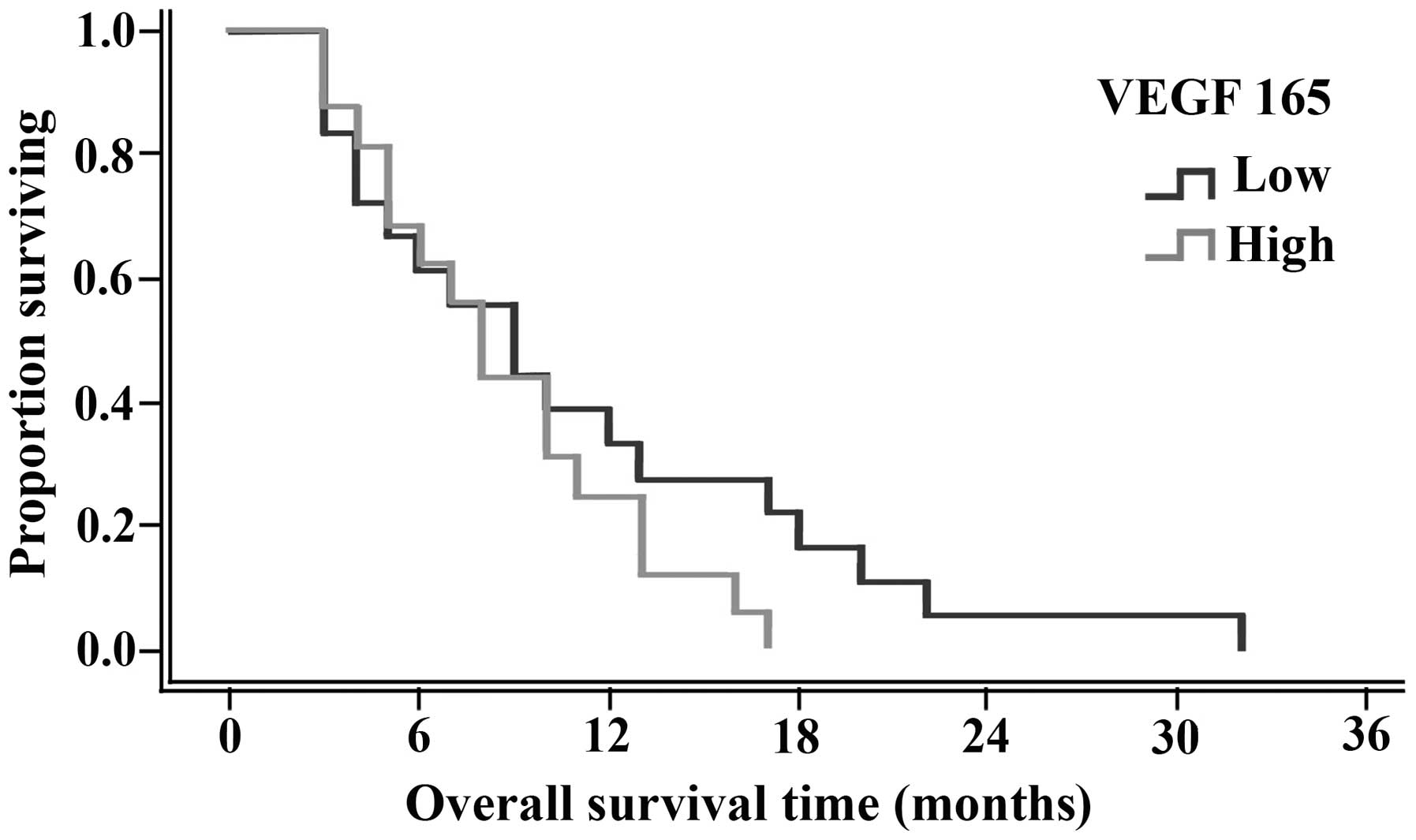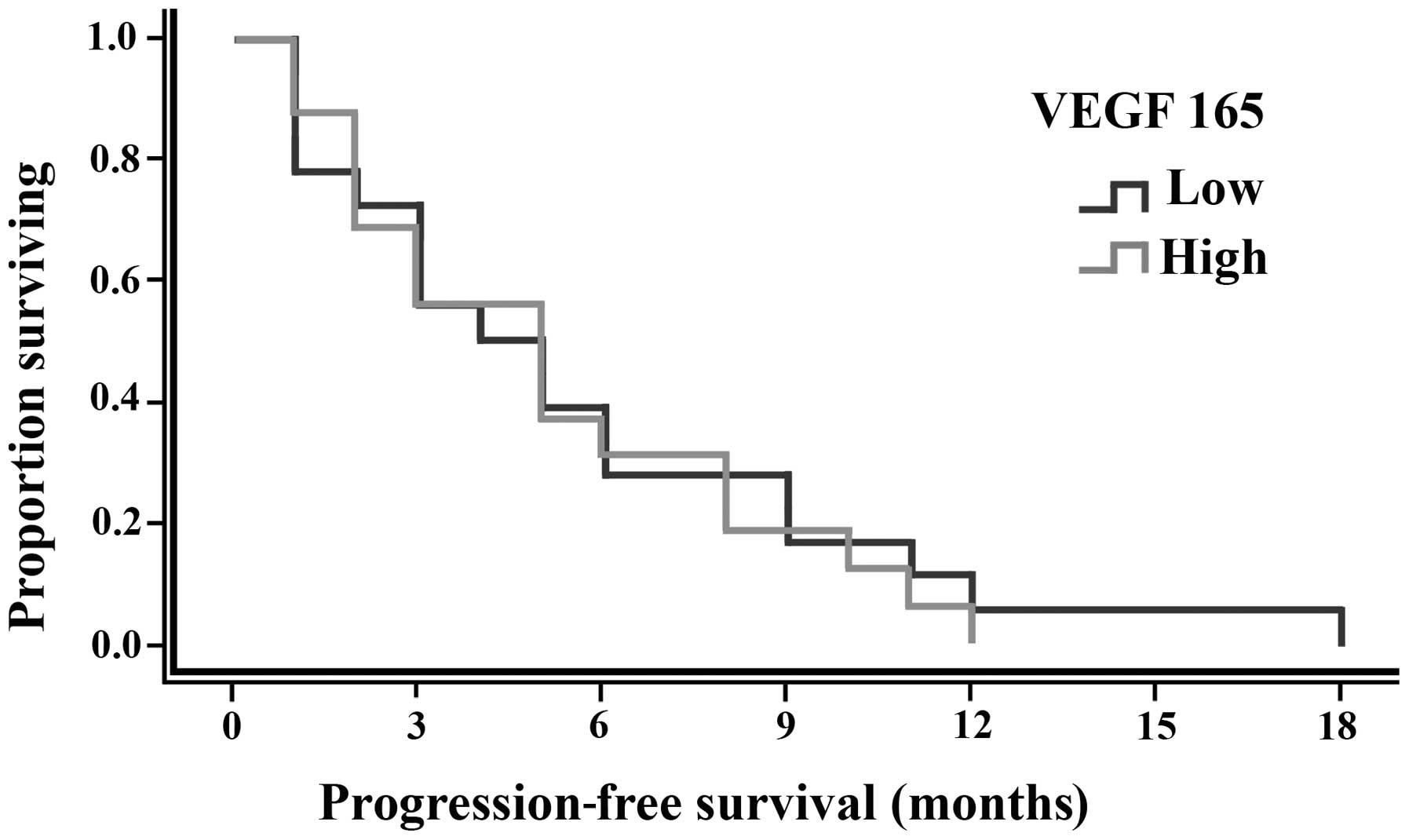|
1
|
Jemal A, Siegel R, Ward E, Hao Y, Xu J,
Murray T and Thun MJ: Cancer statistics, 2008. CA Cancer J Clin.
58:71–96. 2008. View Article : Google Scholar
|
|
2
|
Sun S, Schiller JH, Spinola M and Minnal
JD: New molecularly targeted therapies for lung cancer. J Clin
Invest. 117:2740–2750. 2007. View
Article : Google Scholar : PubMed/NCBI
|
|
3
|
Galligioni E and Ferro A: Angiogenesis and
antiangiogenic agents in non-small cell lung cancer. Lung Cancer.
34(Suppl 4): S3–S7. 2001. View Article : Google Scholar : PubMed/NCBI
|
|
4
|
Loureiro RM and D’Amore PA:
Transcriptional regulation of vascular endothelial growth factor in
cancer. Cytokine Growth Factor Rev. 16:77–89. 2005. View Article : Google Scholar : PubMed/NCBI
|
|
5
|
Neufeld G, Cohen T, Gengrinovitch S and
Poltorak Z: Vascular endothelial growth factor (VEGF) and its
receptors. FASEB J. 13:9–22. 1999.PubMed/NCBI
|
|
6
|
Lei J, Jiang A and Pei D: Identification
and characterisation of a new splicing variant of vascular
endothelial growth factor: VEGF183. Biochim Biophys Acta.
1443:400–406. 1998. View Article : Google Scholar : PubMed/NCBI
|
|
7
|
Park JE, Keller GA and Ferrara N: The
vascular endothelial growth factor (VEGF) isoforms: differential
deposition into the subepithelial extracellular matrix and
bioactivity of extracellular matrix-bound VEGF. Mol Biol Cell.
4:1317–1326. 1993. View Article : Google Scholar
|
|
8
|
Dawson B and Trapp RG: Basic and Clinical
Biostatistics. 3rd edition. Lange Medical Books-McGraw Hill; New
York, NY: 2001
|
|
9
|
Auberger J, Loeffler-Ragg J, Wurzer W and
Hilbe W: Targeted therapies in non-small cell lung cancer: proven
concepts and unfulfilled promises. Curr Cancer Drug Targets.
6:271–294. 2006. View Article : Google Scholar : PubMed/NCBI
|
|
10
|
Ferrara N, Houck K, Jakeman L and Leung
DW: Molecular and biological properties of the vascular endothelial
growth factor family of proteins. Endocr Rev. 13:18–32. 1992.
View Article : Google Scholar : PubMed/NCBI
|
|
11
|
Ferrara N, Gerber HP and LeCounter J: The
biology of VEGF and its receptors. Nat Med. 9:669–676. 2003.
View Article : Google Scholar : PubMed/NCBI
|
|
12
|
Brown LF, Berse B, Jackman RW, Tognazzi K,
Guidi AJ, Dvorak HF, Senger DR, Connolly JL and Schnitt SJ:
Expression of vascular permeability factor (vascular endothelial
growth factor) and its receptors in breast cancer. Hum Pathol.
26:86–91. 1995. View Article : Google Scholar : PubMed/NCBI
|
|
13
|
Matsuyama W, Hashiguchi T, Mizoguchi A,
Iwami F, Kawabata M, Arimura K and Osame M: Serum levels of
vascular endothelial growth factor depends on the stage of
progression lung cancer. Chest. 118:948–951. 2000. View Article : Google Scholar : PubMed/NCBI
|
|
14
|
Koukourakis MI, Giatromanolaki A, Thorpe
PE, et al: Vascular endothelial growth factor/KDR activated
microvessel density versus CD31 standard microvessel density in
non-small cell lung cancer. Cancer Res. 60:3088–3095.
2000.PubMed/NCBI
|
|
15
|
Takigawa N, Segawa Y, Fujimoto N, Hotta K
and Eguchi K: Elevated vascular endothelial growth factor levels in
sera of patients with lung cancer. Anticancer Res. 18:1251–1254.
1998.PubMed/NCBI
|
|
16
|
Yuan A, Yu C, Luh K, Chen W, Lin F, Kuo S
and Yang PC: Quantification of VEGF mRNA expression in non-small
cell lung cancer using a real-time quantitative reverse
transcription-PCR assay and a comparison with quantitative reverse
transcription-PCR. Lab Invest. 80:1671–1680. 2000. View Article : Google Scholar : PubMed/NCBI
|
|
17
|
Kishiro I, Kato S, Fuse D, Yoshida T,
Machida S and Kaneko N: Clinical significance of vascular
endothelial growth factor in patients with primary lung cancer.
Respirology. 7:93–98. 2002. View Article : Google Scholar : PubMed/NCBI
|
|
18
|
Kaya A, Ciledag A, Gulbay BE, Poyraz BM,
Celik G, Sen E, et al: The prognostic significance of vascular
endothelial growth factor levels in sera of non-small cell lung
cancer patients. Respir Med. 98:632–636. 2004. View Article : Google Scholar : PubMed/NCBI
|
|
19
|
Shimanuki Y, Takahashi K, Cui R, Hori S,
Takahashi F, Miyamoto H and Fukurchi Y: Role of serum vascular
endothelial growth factor in the prediction of angiogenesis and
prognosis for non-small cell lung cancer. Lung. 183:29–42. 2005.
View Article : Google Scholar : PubMed/NCBI
|
|
20
|
Laack E, Scheffler A, Burkholder I,
Boeters I, Andritzky B, Schuch G, et al: Pretreatment vascular
endothelial growth factor (VEGF) and matrix metalloproteinase-9
(MMP-9) serum levels in patients with metastatic non-small cell
lung cancer (NSCLC). Lung Cancer. 50:51–58. 2005. View Article : Google Scholar : PubMed/NCBI
|
|
21
|
Brattström D, Bergqvist M, Hesselius P,
Larsson A, Lamberg K, Wernlund J, et al: Elevated preoperative
serum levels of angiogenic cytokines correlate to larger primary
tumours and poorer survival in non-small cell lung cancer patients.
Lung Cancer. 37:57–63. 2002.
|
|
22
|
Imoto H, Osaki T, Taga S, Ohgami A,
Ichiyoshi Y and Yasumoto K: Vascular endothelial growth factor
expression in non-small-cell lung cancer: prognostic significance
in squamous cell carcinoma. J Thorac Cardiovasc Surg.
115:1007–1114. 1998. View Article : Google Scholar : PubMed/NCBI
|
|
23
|
Brattström D, Bergqvist M, Larsson A,
Holmertz J, Hesselius P, Rosenberg L, et al: Basic fibroblast
growth factor and vascular endothelial growth factor in sera from
non-small cell lung cancer patients. Anticancer Res. 18:1123–1127.
1998.PubMed/NCBI
|
|
24
|
Niklińska W, Burzykowski T, Chyczewski L
and Nikliński J: Expression of vascular endothelial growth factor
(VEGF) in non-small cell lung cancer (NSCLC): association with p53
gene mutation and prognosis. Lung Cancer. 34(Suppl 2): S59–S64.
2001.PubMed/NCBI
|
|
25
|
Kim KJ, Li B, Winer J, Armanini M, Gillett
N, Phillips HS and Ferrara N: Inhibition of vascular endothelial
growth factor-induced angiogenesis suppresses tumour growth in
vivo. Nature. 362:841–844. 1993. View
Article : Google Scholar : PubMed/NCBI
|
|
26
|
Ferrara N and Davis-Smyth T: The biology
of vascular endothelial growth factor. Endocr Rev. 18:4–25. 1997.
View Article : Google Scholar
|
|
27
|
Robinson CJ and Stringer SE: The splice
variants of vascular endothelial growth factor (VEGF) and their
receptors. J Cell Sci. 114:853–865. 2001.PubMed/NCBI
|
|
28
|
Dickinson PJ, Sturges BK, Higgins RJ, et
al: Vascular Endothelial Growth Factor mRNA Expression and
Peritumoral Edema in Canine Primary Central Nervous System Tumors.
Vet Pathol. 45:131–139. 2008. View Article : Google Scholar : PubMed/NCBI
|
|
29
|
Berkman RA, Merrill MJ, Reinhold WC, et
al: Expression of the vascular permeability factor/vascular
endothelial growth factor gene in central nervous system neoplasms.
J Clin Invest. 91:153–159. 1993. View Article : Google Scholar : PubMed/NCBI
|
|
30
|
Huang H, Held-Feindt J, Buhl R, Mehdorn HM
and Mentlein R: Expression of VEGF and its receptors in different
brain tumors. Neurol Res. 27:371–377. 2005. View Article : Google Scholar : PubMed/NCBI
|
|
31
|
Munaut C, Boniver J, Foidart JM and Deprez
M: Macrophage migration inhibitory factor (MIF) expression in human
glioblastomas correlates with vascular endothelial growth factor
(VEGF) expression. Neuropathol Appl Neurobiol. 28:452–460. 2002.
View Article : Google Scholar
|
|
32
|
Pistolesi S, Boldrini L, Gisfredi S, De
Ieso K, Camacci T, Caniglia M, Lupi G, Leocata P, Basolo F,
Pingitore R, Parenti G and Fontanini G: Angiogenesis in
intracranial meningiomas: immunohistochemical and molecular study.
Neuropathol Appl Neurobiol. 30:118–125. 2004. View Article : Google Scholar : PubMed/NCBI
|
|
33
|
Hyodo I, Doi T, Endo H, Hosokawa Y,
Nishikawa Y, Tanimizu M, Jinno K and Kotani Y: Clinical
significance of plasma vascular endothelial growth factor in
gastrointestinal cancer. Eur J Cancer. 34:2041–2045. 1998.
View Article : Google Scholar : PubMed/NCBI
|
|
34
|
Webb NJ, Bottomley MJ, Watson CJ, et al:
Vascular endothelial growth factor (VEGF) is released from
platelets during blood clotting: implications for measurement of
circulating VEGF levels in clinical disease. Clin Sci (Lond).
94:395–404. 1998.PubMed/NCBI
|
|
35
|
Banks RE, Forbes MA, Kinsey SE, et al:
Release of the angiogenic cytokine vascular endothelial growth
factor (VEGF) from platelets: significance for VEGF measurements
and cancer biology. Br J Cancer. 77:956–64. 1998. View Article : Google Scholar : PubMed/NCBI
|
|
36
|
Tokunaga T, Oshika Y, Abe Y, et al:
Vascular endothelial growth factor (VEGF) mRNA isoform expression
patterns is correlated with liver metastasis and poor prognosis in
colon cancer. Br J Cancer. 77:998–1002. 1998. View Article : Google Scholar : PubMed/NCBI
|
|
37
|
Oshika Y, Nakamura M, Tokunaga T, Ozeki Y,
Fukushima Y, Hatanaka H, Abe Y, Yamazaki H, Kijima H, Tamaoki N and
Ueyama Y: Expression of cell-associated isoform of vascular
endothelial growth factor 189 and its prognostic relevance in
non-small cell lung cancer. Int J Oncol. 12:541–544.
1998.PubMed/NCBI
|
|
38
|
Zygalaki E, Tsaroucha EG, Kaklamanis L and
Lianidou ES: VEGF Splice Variants and VEGFRs in NSCLC. Clinical
Chemistry. 53:1433–1439. 2007.
|
|
39
|
Timotheadou E, Murray S, Linardou H,
Vrettou A, Skrickova J, Kosmidis P, Skarlos D, Pectasides D and
Fountzilas G: VEGF165, Bcl-2, p53, COX-2 and HER-family
expression in patients with stage IB-IIIA
completely resected non-small cell lung cancer (NSCLC) and
correlation with clinical outcome. J Clin Oncol. 23(Suppl 16):
S72462005.
|
|
40
|
Yuan A, Yu CJ, Kuo SH, et al: Vascular
endothelial growth factor 189 mRNA isoform expression specifically
correlates with tumor angiogenesis, patient survival, and
postoperative relapse in non-small-cell lung cancer. J Clin Oncol.
19:432–441. 2001.
|
|
41
|
Brattström D, Bergqvist M, Hesselius P, et
al: Serum VEGF and bFGF adds prognostic information in patients
with normal platelet counts when sampled before, during and after
treatment for locally advanced non-small cell lung cancer. Lung
Cancer. 43:55–62. 2004.
|
|
42
|
Bonnesen B, Pappot H, Holmstav J and Skov
BG: Vascular endothelial growth factor A and vascular endothelial
growth factor receptor 2 expression in non-small cell lung cancer
patients: Relation to prognosis. Lung Cancer. 66:314–318. 2009.
View Article : Google Scholar : PubMed/NCBI
|
|
43
|
Tas F, Duranyildiz D, Oguz H, Camlica H,
Yasasever V and Topuz E: Serum vascular endothelial growth factor
(VEGF) and Bcl-2 levels in advanced stage non-small cell lung
cancer. Cancer Invest. 24:576–580. 2006. View Article : Google Scholar : PubMed/NCBI
|
|
44
|
Strauss GM and Cummings KM:
Smoking-related adenocarcinoma of the lung: Now the most common
cause of cancer death in the US. Am Soc Clin Oncol.
22:25672003.
|
|
45
|
Farias E, Ranuncolo S, Cresta C, et al:
Plasma metalloproteinase activity is enhanced in the euglobulin
fraction of breast and lung cancer patients. Int J Cancer.
89:389–394. 2000. View Article : Google Scholar : PubMed/NCBI
|
|
46
|
Gregorc V, Ludovini V, Pistola S, et al:
Vascular endothelial growth factor serum levels (VEGFsl) in
non-small cell lung cancer (NSCLC) patients: correlation with
histology and stage. Ann Oncol. 11:124(Abstr 566). 2000.
|
|
47
|
Laack E, Köhler A, Kugler C, et al:
Pretreatment serum levels of matrix metalloproteinase-9 and
vascular endothelial growth factor in non-small-cell lung cancer.
Ann Oncol. 13:1550–1557. 2002. View Article : Google Scholar : PubMed/NCBI
|
|
48
|
Trapé J, Buxó J and de Olaguer JP: Serum
concentrations of vascular endothelial growth factor in advanced
non-small cell lung cancer. Clin Chem. 49:523–525. 2003.
|
|
49
|
Fontanini G, Boldrini L, Chinè S, Pisaturo
F, Basolo F, Calcinai A, Lucchi M, Mussi A, Angeletti CA and
Bevilacqua G: Expression of vascular endothelial growth factor mRNA
in non-small-cell lung carcinomas. Br J Cancer. 79:363–369. 1999.
View Article : Google Scholar : PubMed/NCBI
|
|
50
|
Ohta Y, Endo Y, Tanaka M, Shimizu J, Oda
M, Hayashi Y, Watanabe Y and Sasaki T: Significance of vascular
endothelial growth factor messenger RNA expression in primary lung
cancer. Clin Cancer Res. 2:1411–1416. 1996.PubMed/NCBI
|
|
51
|
Han H, Silverman JF, Santucci TS, Macherey
RS, d’Amato TA, Tung MY, et al: Vascular endothelial growth factor
expression in stage I non-small cell lung cancer correlates with
neoangiogenesis and a poor prognosis. Ann Surg Oncol. 8:72–79.
2001. View Article : Google Scholar : PubMed/NCBI
|
|
52
|
Stefanou D, Batistatou A, Arkoumani E, et
al: Expression of vascular endothelial growth factor (VEGF) and
association with microvessel density in small-cell and
non-small-cell lung carcinomas. Histol Histopathol. 19:37–42.
2004.PubMed/NCBI
|
|
53
|
Seto T, Higashiyama M, Funai H, Imamura F,
Uematsu K, Seki N, et al: Prognostic value of expression of
vascular endothelial growth factor and its flt-1 and KDR receptors
in stage I non-small-cell lung cancer. Lung Cancer. 53:91–96. 2006.
View Article : Google Scholar : PubMed/NCBI
|
|
54
|
Dziadziuszko R, Chyczewski L, Jassem E and
Jassem J: Expression of vascular endothelial growth factor (VEGF)
and its receptor FLK-1 in non-small cell lung cancer (NSCLC) - a
preliminary report. Folia Histochem Cytobiol. 39(Suppl 2): 100–101.
2001.PubMed/NCBI
|
|
55
|
Mattern J, Koomägi R and Volm M:
Association of vascular endothelial growth factor expression with
intratumoral microvessel density and tumour cell proliferation in
human epidermoid lung carcinoma. Br J Cancer. 73:931–934. 1996.
View Article : Google Scholar
|
|
56
|
Shibusa T, Shijubo N and Abe S: Tumor
angiogenesis and vascular endothelial growth factor expression in
stage I lung adenocarcinoma. Clin Cancer Res. 4:1483–1487.
1998.PubMed/NCBI
|
|
57
|
Takanami I, Tanaka F, Hashizume T and
Kodaira S: Tumor angiogenesis in pulmonary adenocarcinomas:
relationship with basic fibroblast growth factor, its receptor, and
survival. Neoplasma. 44:295–298. 1997.PubMed/NCBI
|
|
58
|
Decaussin M, Sartelet H, Robert C, Moro D,
Claraz C, et al: Expression of vascular endothelial growth factor
(VEGF) and its two receptors (VEGF-R1-Flt1 and VEGF-R2-Flk1/KDR) in
nonsmall cell lung carcinoma (NSCLCs): correlation with
angiogenesis and survival. J Pathol. 188:369–377. 1999. View Article : Google Scholar
|
|
59
|
Giatromanolaki A, Koukourakis MI,
Kakolyris S, Turley H, O’Byrne KJ, Scott PAE, Pezzella F,
Georgoulias V, Harris AL and Gatter KC: Vascular endothelial growth
factor, wild-type p53 and angiogenesis in early operable non-small
cell lung cancer. Clin Cancer Res. 4:3017–3024. 1998.PubMed/NCBI
|
|
60
|
Fontanini G, Vignati S, Boldrini L, Chinè
S, Silvestri V, Lucchi M, Mussi A, Angeletti CA and Bevilacqua G:
Vascular endothelial growth factor is associated with
neovascularization and influences progression of non-small cell
lung carcinoma. Clin Cancer Res. 3:861–865. 1997.PubMed/NCBI
|
|
61
|
Sheng H, Aoe M, Doihara H, Andou A and
Shimizu N: Prognostic value of vascular endothelial growth factor
expression in primary lung carcinoma. Acta Med Okayama. 54:119–126.
2000.PubMed/NCBI
|


















